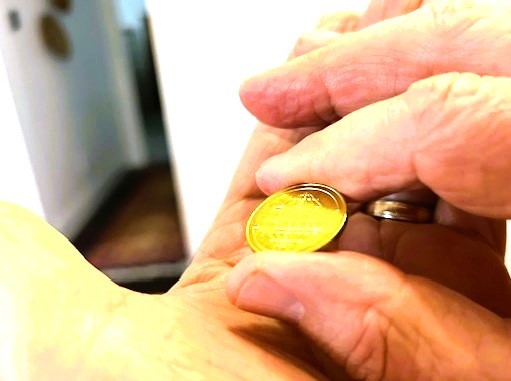Shiny

By Alan Caldwell
Jess held the gleaming coin between her thumb and forefinger, slowly kneading its dual surfaces in a circular motion, tracing the flowing dress of Lady Liberty on one surface and the fine feathers of the eagle’s neck on the other. She examined each coin similarly, then returned each to its plastic sleeve. Ten coins to a sleeve, ten sleeves—one hundred gold coins, just over six pounds, at the going price of two thousand dollars an ounce.
Jess placed each sleeve in the metal safety deposit box and inserted the box back into its niche in the tiny room downstairs in the bank, quiet and lifeless as a morgue. She closed the small door, locking and securing the box inside.
One coin remained in her hand. She couldn’t understand how she had missed it.
She considered reopening the box and finding the plastic sleeve with the missing coin. She shook her head and, to no living soul, said aloud, “No.” Stuffing the coin into the pocket of her jeans, she left.
As she drove away from the bank, Jess contemplated the prodigal coin and what her husband might think. Her mind shifted to how he’d basked in the brilliant light that shone through the stained glass and illuminated the polished oak of his pulpit. Jess could still see her good husband, his arms swinging like a windmill as he extolled the cardinal virtues and the redemptive power of Christ’s sacrifice.
He also liked pressed shirts, crisp suits, polished shoes—shiny things. Like that flawless coin in her pocket. The coins were their future. That’s what he’d always told her. As a young man, he had inherited ten coins from his uncle. Captured by their beauty, their satiny feel in his hand, he had scraped and saved to buy more, one by one. He would hold each newly purchased coin up to the light above the kitchen table and show it to her before spiriting it away to the bank.
Jess always wondered if she were shiny enough for him. She feared that she might be too common and dowdy, that the fashionable ladies of the congregation might gossip about how she and the handsome pastor didn’t seem well matched. She fretted that the men might tally her beauty on a simple numerical scale and scoff at her moderate value.
She worried about so many things, with the deepest fear about her mediocrity. Her voice wasn’t good enough for the choir. She stumbled when reading aloud in Bible class. Even the cookies she’d tried to make for the youth group bake sale had burn marks on the bottom—she’d bought cupcakes at the bakery and donated them instead.
Her good husband always tried to assuage those fears. He would sit at the kitchen table facing her, his hands on her knees, and assure her that she was above reproach—that her price was far above rubies. Sometimes, he even made her believe these things. But she never felt shiny.
And then he was gone, cold on the floor of his study, only forty-two years old. There had been an autopsy, the cause of death blockage in a descending artery—words meaningless in her fog of grief. Then a doctor said one word: “Widow-maker,” and she understood.

Jess traced the outline of the coin in her pocket, to think of him again at the kitchen table and at the pulpit, and to make sure that the coin was still there.
She circled through the town once more, and then headed east. She passed the bank and then the school and then the church. She drove for a long time with no destination in mind, just driving. Soon, she passed the town’s limits where the spring sun resurrected the grasses of the fields, and the yellow daffodils and paper white narcissus bloomed where long-decayed farmhouses once stood.
She traveled far away from the town, leaving behind the bank, and the school, and the church where the brilliant light shone through the stained glass and illuminated the polished oak of his pulpit. Up ahead, Jess saw a man in a yellow reflective vest holding a red sign that said “stop.” Slowing, could see more workers and pavers ahead. She stopped and studied the man with the sign. His skin was bronzed, and his hair and beard were dark and long, tangled by wind and matted with road dust.
Jess adjusted her body, reached into her pocket, and retrieved the coin. Lowering the car’s window, she called to the man holding the stop sign. “I have something for you if you want it.”

Alan Caldwell has been teaching public school in Georgia since 1994. He only began writing in May 2022 and has since been published in dozens of magazines and journals. Two of his stories have been nominated for the Pushcart Prize. His first book, However Small and Hidden, will be published by Close to the Bone Publishing, slated for release on May 31, 2024.


